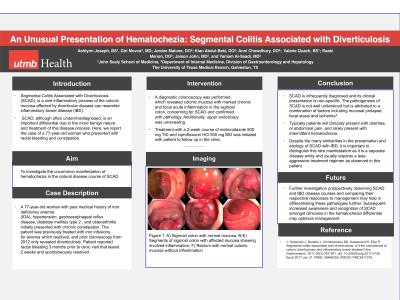Tuesday Poster Session
Category: GI Bleeding
P3510 - An Unusual Presentation of Hematochezia: Segmental Colitis Associated With Diverticulosis
Tuesday, October 24, 2023
10:30 AM - 4:00 PM PT
Location: Exhibit Hall

Has Audio

Ashlynn Joseph, BSc
John Sealy School of Medicine, University of Texas Medical Branch
DALLAS, TX
Presenting Author(s)
Ashlynn Joseph, BSc1, Giri Movva, MD2, Jordan Malone, DO2, Kian Abdul-Baki, DO2, Anni Chowdhury, DO2, Valerie Quach, BSc1, Raakhi Menon, DO2, Jaison S. John, MD2, Yamam Al Saadi, MBBS2
1John Sealy School of Medicine, University of Texas Medical Branch, Galveston, TX; 2University of Texas Medical Branch, Galveston, TX
Introduction: Segmental Colitis Associated with Diverticulosis (SCAD) is a rare inflammatory process of the colonic mucosa affected by diverticular disease which can resemble inflammatory bowel disease (IBD). Due to its non-specific features, SCAD is often under-diagnosed. Nonetheless, it is an important differential due to the more benign nature and treatment of this disease process. Here, we report the case of a woman with SCAD who presented with rectal bleeding and constipation.
Case Description/Methods: A 77-year-old woman with past medical history of iron deficiency anemia (IDA), hypertension, gastroesophageal reflux disease, diabetes mellitus type 2, and osteoarthritis initially presented to the clinic with chronic constipation. The patient was previously treated with iron infusions for anemia which resolved, and prior colonoscopy from 2012 only revealed diverticulosis. The patient reported rectal bleeding 3 months prior to clinic visit that lasted 2 weeks and spontaneously resolved. A diagnostic colonoscopy was performed, which revealed colonic mucosa with marked chronic and focal acute inflammation in the sigmoid colon, concerning for SCAD and confirmed with pathology. Additionally, upper endoscopy was unrevealing. Treatment with a 2-week course of metronidazole 500 mg TID and ciprofloxacin HCl 500 mg BID was initiated with patient to follow up in the clinic.
Discussion: SCAD is infrequently diagnosed, and its clinical presentation is non-specific. The pathogenesis of SCAD is not well understood but is attributed to a combination of factors including mucosal prolapse, fecal stasis, and ischemia. Typically, patients will clinically present with diarrhea or abdominal pain, and rarely present with intermittent hematochezia as seen in our patient. SCAD does not involve the rectum, which helps to differentiate it from ulcerative colitis. Additionally, it only involves areas of the colon that have diverticular disease, and as such is often found in the sigmoid colon. Initial treatment consists of a course of oral antibiotics. Mesalamine is used in those that fail to respond to antibiotic therapy. If further treatment is required, systemic steroids and surgical segmental resection can be considered. Despite the many similarities in the presentation and etiology of SCAD with IBD, it is important to distinguish this rare manifestation as it is a separate disease entity and usually requires a less-aggressive treatment regimen.

Disclosures:
Ashlynn Joseph, BSc1, Giri Movva, MD2, Jordan Malone, DO2, Kian Abdul-Baki, DO2, Anni Chowdhury, DO2, Valerie Quach, BSc1, Raakhi Menon, DO2, Jaison S. John, MD2, Yamam Al Saadi, MBBS2. P3510 - An Unusual Presentation of Hematochezia: Segmental Colitis Associated With Diverticulosis, ACG 2023 Annual Scientific Meeting Abstracts. Vancouver, BC, Canada: American College of Gastroenterology.
1John Sealy School of Medicine, University of Texas Medical Branch, Galveston, TX; 2University of Texas Medical Branch, Galveston, TX
Introduction: Segmental Colitis Associated with Diverticulosis (SCAD) is a rare inflammatory process of the colonic mucosa affected by diverticular disease which can resemble inflammatory bowel disease (IBD). Due to its non-specific features, SCAD is often under-diagnosed. Nonetheless, it is an important differential due to the more benign nature and treatment of this disease process. Here, we report the case of a woman with SCAD who presented with rectal bleeding and constipation.
Case Description/Methods: A 77-year-old woman with past medical history of iron deficiency anemia (IDA), hypertension, gastroesophageal reflux disease, diabetes mellitus type 2, and osteoarthritis initially presented to the clinic with chronic constipation. The patient was previously treated with iron infusions for anemia which resolved, and prior colonoscopy from 2012 only revealed diverticulosis. The patient reported rectal bleeding 3 months prior to clinic visit that lasted 2 weeks and spontaneously resolved. A diagnostic colonoscopy was performed, which revealed colonic mucosa with marked chronic and focal acute inflammation in the sigmoid colon, concerning for SCAD and confirmed with pathology. Additionally, upper endoscopy was unrevealing. Treatment with a 2-week course of metronidazole 500 mg TID and ciprofloxacin HCl 500 mg BID was initiated with patient to follow up in the clinic.
Discussion: SCAD is infrequently diagnosed, and its clinical presentation is non-specific. The pathogenesis of SCAD is not well understood but is attributed to a combination of factors including mucosal prolapse, fecal stasis, and ischemia. Typically, patients will clinically present with diarrhea or abdominal pain, and rarely present with intermittent hematochezia as seen in our patient. SCAD does not involve the rectum, which helps to differentiate it from ulcerative colitis. Additionally, it only involves areas of the colon that have diverticular disease, and as such is often found in the sigmoid colon. Initial treatment consists of a course of oral antibiotics. Mesalamine is used in those that fail to respond to antibiotic therapy. If further treatment is required, systemic steroids and surgical segmental resection can be considered. Despite the many similarities in the presentation and etiology of SCAD with IBD, it is important to distinguish this rare manifestation as it is a separate disease entity and usually requires a less-aggressive treatment regimen.

Figure: Figure 1. A) Sigmoid colon with normal mucosa; B-E) Segments of sigmoid colon with affected mucosa showing involved inflammation; F) Rectum with normal colonic mucosa without inflammation
Disclosures:
Ashlynn Joseph indicated no relevant financial relationships.
Giri Movva indicated no relevant financial relationships.
Jordan Malone indicated no relevant financial relationships.
Kian Abdul-Baki indicated no relevant financial relationships.
Anni Chowdhury indicated no relevant financial relationships.
Valerie Quach indicated no relevant financial relationships.
Raakhi Menon indicated no relevant financial relationships.
Jaison John indicated no relevant financial relationships.
Yamam Al Saadi indicated no relevant financial relationships.
Ashlynn Joseph, BSc1, Giri Movva, MD2, Jordan Malone, DO2, Kian Abdul-Baki, DO2, Anni Chowdhury, DO2, Valerie Quach, BSc1, Raakhi Menon, DO2, Jaison S. John, MD2, Yamam Al Saadi, MBBS2. P3510 - An Unusual Presentation of Hematochezia: Segmental Colitis Associated With Diverticulosis, ACG 2023 Annual Scientific Meeting Abstracts. Vancouver, BC, Canada: American College of Gastroenterology.
